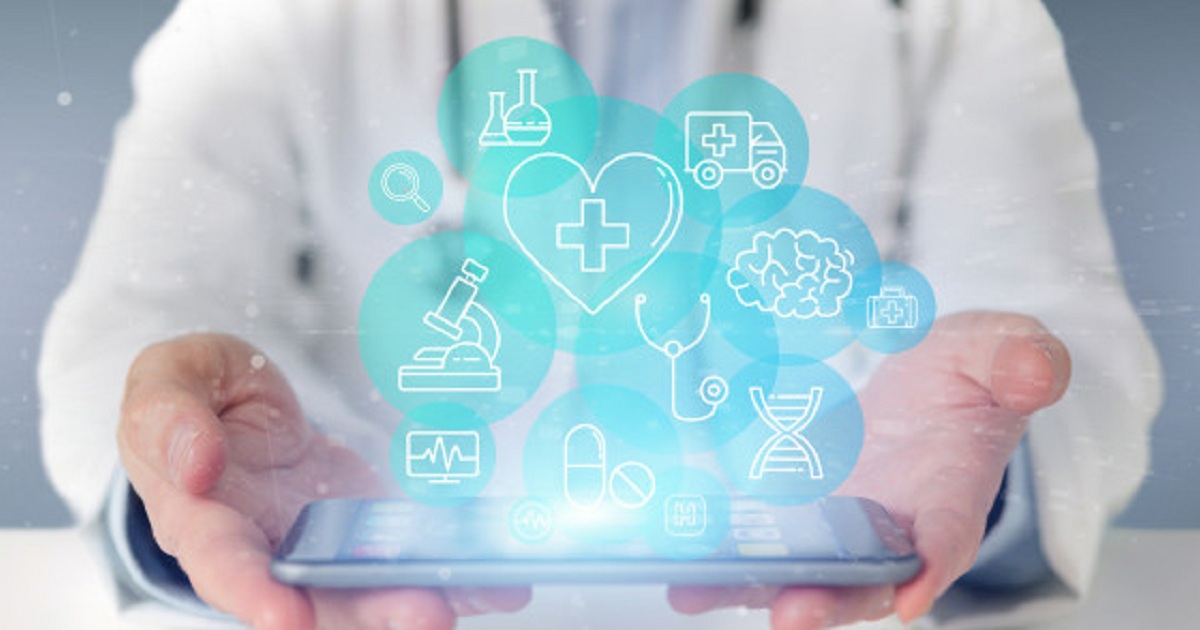
Health Technology, Digital Healthcare
Article | August 16, 2023
The pandemic-fueled technology adoption has enabled the healthcare industry to address the challenges, including cybersecurity, telehealth, invoicing and payment processing, patient experience, effective payment model, and big data. The responses to the unusual COVID-19 pandemic has sped up the adoption of new digital technologies in the industry. It has also fueled advancements in health technology. From the start of 2020, these advancements transformed the healthcare industry into a next-gen one by accelerating digitization of their internal and external operations by two to three years.
This surprising impact of technology in the healthcare industry has brought out unexpected competition between the key players in the B2B healthcare market. Whatever the field, adapting yourself to modern changes is the best strategy to thrive. Get yourself updated according to the changes or get yourself outdated is the new norm in the healthcare industry.
The following trends and advancements in technology in the healthcare industry due to the pandemic in 2020 show that healthcare providers are always searching for new ways to improve their productivity, performance, and efficiency. These were the need of the hour during the pandemic, for them to surge ahead of their competitors.
• Telemedicine
• Artificial Intelligence (AI) in healthcare
• The Internet of Medical Things (IoMT)
• Supply chain management technology
• Privacy issues
• AR/VR/MR in Healthcare
• Blockchain
• Digital marketing trends in healthcare
This article looks into the major innovations, advancements, and trends brought out by the global pandemic in 2020 in the healthcare industry.
Pandemic-fueled Advancements
One of the biggest challenges faced by the healthcare industry in the US today is its digital capacity to effectively engage consumers and make them stay healthy. This can include helping people to prevent getting infected by various diseases such as COVID-19 and effectively managing various other chronic conditions. This is where technology in the healthcare industry has a major role to play.
Due to the latest advancements in technology, the healthcare industry was already evolving but the COVID-19 pandemic accelerated this transformation dramatically. McKinsey reports that US$250 billion was spent on technology in the US healthcare industry to shift the industry into a virtual care model in the wake of the pandemic. Also, a study by FAIR Health, a non-profit group, says the increase in telehealth claims in the US is 4,000% in 2020.
Here’s a detailed look into the above-mentioned advancements, innovations or trends brought out by the pandemic in the industry.
Telemedicine
Had the world ever thought that it would be possible one day for doctors to remotely examine the health of patients via a smartphone or a computer? Telemedicine, a new trend in technology in the healthcare industry, addresses many challenges in the industry. Improved technology in the industry has made telemedicine easier, even for people, who are not computer savvy. Telehealth services are now provided through different telemedicine apps.
In the light of the pandemic, rather than in-person visits, 43.5% of primary medical visits were done using telehealth methods in April 2020 in the US. The major benefit of telemedicine is that it reduces contact between healthcare workers, patients, and other patients. This reduces the chances of the spread of infectious diseases.
Reports say that 71% of Americans considered telemedicine useful at the beginning of the pandemic. This trend is expected to continue in the coming years too. With the pandemic, telemedicine saw an immediate boom compared to previous years. This boom in telehealth is projected to break US$185.6 billion by 2026.
Artificial Intelligence (AI) in healthcare
Artificial intelligence, a new trend and advancement in technology in the healthcare industry, had a critical role in fighting the pandemic. AI played a major role in areas such as pandemic detection, vaccine development, facial recognition with masks, thermal screening, and analyzing CT scans. AI is becoming the new operating technology in the healthcare industry.
Major AI healthcare applications
Healthcare providers will benefit a lot from AI-driven tools as AI technology in the healthcare industry has become a transformational force. Machine learning algorithms and software in AI will revolutionize the use of technology in the healthcare industry and the science of healthcare in the coming years too. AI will unify machines and humans through the brain. Some of the AI technologies in the healthcare industry, which are very relevant, are machine learning, natural language processing (NLP), rule-based expert systems, physical robots, diagnostic and treatment, patient engagement and adherence, and administrative applications.
Benefits of AI in healthcare and statistics
AI addresses many challenges that present technology in the healthcare industry cannot tackle. Better data-driven decisions, increased disease diagnosis efficiency, reduced treatment time, easy integration of information, reduced costs, increased patient satisfaction, fewer errors, and easier payment options are some of the benefits AI-assisted technology in the healthcare industry can provide.
According to an analysis by Accenture, by 2026, clinical AI health applications are expected to create approximately US$150 billion for the US healthcare economy as annual savings. Also, the US AI health market is expected to reach around US$6.6 billion by 2021.
The Internet of Medical Things (IoMT)
Nowadays, medical interactions involve some sort of equipment or device; it can be a glucose monitor, blood pressure monitor, or even an MRI scanner. It may not be a surprise now that, according to a 2020 Deloitte report, the available number of medical technologies are around 50,000. The internet-connected devices, which are known as IoMT tools, are transforming the healthcare and technology in the healthcare industry.
What Is IoMT?
The connected infrastructure of software applications, medical devices, and health systems and services are the IoMT. This has emerged by combining IoT development with telehealth technologies and telemedicine.
Potential of IoMT in healthcare and statistics
Lower costs for care, fewer mistakes, and more accurate diagnosis are the potential capabilities of IoMT. IoMT paired with various smartphone applications allows patients to send information regarding their health to doctors and get treated for diseases. This type of technology-driven healthcare not only improves patient experiences but also reduces the cost. IoMT, the new trend in technology in the healthcare industry, also has a positive effect on drug management.
According to Goldman Sachs, IoMT will save US$300 billion annually in the healthcare industry. AllTheResearch expects that the global IoMT market value will reach US$254.2 billion from US$44.5 billion in 2018.
Supply chain management technology in the healthcare industry
Utilizing advanced supply chain management technology in the healthcare industry enables healthcare providers to reach the right patients with the right product at the right time. Digitalized supply chain management also makes healthcare organizations improve provider-patient connectedness, data flow and analytics, regulatory compliance, and asset tracking.
A range of challenges faced by healthcare providers prompts you to digitalize supply chain networks, using the latest technologies in the healthcare industry. Advanced supply chain management technology will help you optimize costs, reduce unnecessary variation due to error and variability, enhance patient care, engagement, and delivery, and address new value-creation priorities.
According to reports from market researchers, global healthcare supply chain management technology is expected to reach US$3.3 billion in 2025 from US$2.2 billion in 2020.
Privacy issues
Privacy is a serious concern in technology in the healthcare industry, especially because of HIPAA compliance in 2020. Although data and information of patients can be efficiently stored and retrieved through cloud computing, complying with the strict electronic Protected Health Information (ePHI) is difficult.
While electronic health records and sensor networks, and advancements in other technologies in the healthcare industry will surely improve the quality of healthcare by reducing medical errors and costs, associated security and privacy are challenges to be addressed. Journal of the American Medical Informatics Association estimated that stolen or lost PHI may cost the US healthcare industry approximately US$7 billion annually.
To solve these issues, hospitals, and other healthcare providers have to stop using outdated technology and adopt state-of-the-art technologies without violating HIPAA. Encryption technology in the healthcare industry is the best option and healthcare providers should start using it to ensure the privacy of patients.
AR, VR, and MR in Healthcare
Virtual (VR) and augmented reality (AR) are important technologies in the healthcare industry to enhance and ensure the quality of telemedicine, especially during the period of the pandemic. The pandemic has made these technologies more popular and the trend is expected to continue in the future too. Both of these technologies in the healthcare industry are used to enhance patient and provider visits and even to educate medical students.
AR and VR also have the potential to help stroke victims overcome deficiencies, assist in robotic surgeries, educate patients before surgeries, facilitate easy surgical planning, help patients with PTSD, and reduce anxiety in children during a painful procedure or blood tests. Mixed reality (MR) is the mixed use of both VR and MR in a patient’s healthcare process and is also gaining popularity.
Blockchain
Blockchain is a trend which is expected to revolutionize technology in the healthcare industry. Using blockchain or digital ledgers will enable you to securely distribute transaction records to patients with improved data security. Along with other trends such as cloud computing and IoMT, blockchain also offers portability, accessibility, and high security. One of the greatest benefits of blockchain technology in the healthcare industry is interoperability.
As blockchain provides full visibility through a digital ledger, it improves integrity and transparency. Blockchain technology in the healthcare industry is beneficial to handle clinical study information, patient wearable data, and patient records.
Scope of blockchain technology in the healthcare industry
Various statistics on blockchain technology in the healthcare industry expect a wide scope for this technology. The global blockchain technology market in the healthcare industry is projected to cross US500 million by 2022.
Digital marketing trends in healthcare
Digital marketing technology in the healthcare industry has been revolutionized as new trends were set by the pandemic in 2020. As the world shrunk to online mode during the pandemic period, the following healthcare digital marketing trends emerged.
Content marketing
The smartest way to attract new patients to your service is content marketing and educational content. 2020 is the time where the content truly emerged as king. Educational content is vital in the healthcare space because everyone always tries to learn new things. It can be a trick or tips about the latest technological advancements, general industry news, or new diagnostic options.
Mobile responsive websites
Another important digital marketing technology in the healthcare industry is making an attractive website, which also must be mobile responsive. In this modern world of technology, everyone wants to access every facility at their fingertips. So, if your website is not mobile responsive, you won’t get traffic to your website easily.
Along with these two trending digital marketing technologies in the healthcare industry, some of the other trends are:
• Video marketing
• Multichannel initiatives and customer touchpoints
• Online reputation
• Powerful presence on social media channels
• Location-based SEO
The essential trends and advancements in technology in the healthcare industry depicting the future of healthcare are machine learning, artificial intelligence, and data science along with a focus on effective healthcare digital marketing technology and strategy. The pandemic fueled B2B healthcare technology will make the industry evolve every year and go on resolving new challenges that arise.
Frequently Asked Questions
Why is technology important to the healthcare industry?
Integrating technology with healthcare industry will improve quality of life. Also, the use of digital technology in the healthcare industry will increase efficiency, quality, and patient experience.
What is new technology in healthcare?
Due to the COVID-19 pandemic, many trending technologies are used in healthcare. The new technologies in the healthcare industries are AI, blockchain, chatbots, voice search, and virtual reality.
What are the negative impacts of medical technology?
Medical technology can have some negative impacts on patients such as impersonal or minimized care, negative health effects, increased patient costs, inappropriate use, and invasion of privacy.
Read More

Digital Healthcare
Article | November 29, 2023
Introduction
Over the past couple of years, there has been a substantial rise in the burden of chronic conditions and treatment costs, along with the growing elderly population, which is transforming the healthcare sector at a rapid pace. As per a study, healthcare spending across the globe is anticipated to reach an unprecedented value to total US$ 18.3 trillion by 2030. In response to these trends, volume-based payment models are being replaced by outcome- or value-based models.
Predictive analytics helps health organizations to get in line with these new models and improve patient care and outcomes. From predicting critical conditions such as heart failure and septic shock to preventing readmissions, the recent advancements in big data analytics are boosting the adoption of new predictive analytics solutions that aid clinicians improve outcomes and cut costs.
Predictive analytics in healthcare is most helpful with clinical care, administrative tasks, and managing operations. More importantly, the technology is already making a difference in a wide range of healthcare settings, from small private doctor's offices and large academic hospitals to healthcare insurance companies.
How is Growing Healthcare Data Favoring the Penetration of Predictive Analytics?
The growing inclination toward digitalization in the healthcare industry has led to the creation of huge new data sets. These include radiology images, electronic medical record (EMR) systems, lab results, and health claims data. The amount of data is expected to reach new avenues with increasing genomics and cytogenesis research data in the near future.
New data is being generated and collected by the novel medical devices at the edge, such as monitors and patient wearables. In addition, outside the healthcare setting, patients are generating quasi-health data through the use of health monitoring applications, fitness trackers, and personal wearable devices.
By using data from these sources, health care providers can find new ways to use predictive modeling for health risks, predictive analytics for medical diagnosis, and prescriptive analytics for personalized medicine.
Predictive analytics has become a crucial component of any strategy for health analytics. Today, it's an essential tool for measuring, combining, and making sense of biometric, psychosocial, and behavioral data that wasn't available or was very hard to get a hold of until recently. Here are some of the applications of predictive analytics for healthcare
Identifying Patients at Risk
Clinical Predictions
Disease Progression and Comorbidities
Predicting Length of Stay
Speeding Treatment of Critical Conditions
Reducing Readmissions
The Future Story
With the growing prominence of innovative technologies across the healthcare industry, a number of health IT providers are focusing on developing their own analytics software and engines to assist healthcare spaces deliver optimal patient care.
For instance, in 2020, Eversana, a U.S.-based provider of innovative solutions to the life sciences industry, announced the introduction of its ACTICS predictive analytics solution, which enables clinical spaces to combine multiple data sources into a single comprehensive system.
Also, some U.S. companies are partnering with healthcare institutions to develop proprietary algorithms designed to enhance organizational performance, improve clinical care, and increase operational efficiency. Such developments are projected to increase the popularity of predictive analytics solutions in the healthcare sector in the coming years.
Read More

Health Technology
Article | September 12, 2023
Effective Healthcare branding changes how the public perceives a healthcare organization. Brands are all about perceptions. The way your customers perceive your organization determines your brand. That encompasses your doctors, your board members, your nurses, and your patients. The process of healthcare branding helps organizations ensure they are perceived the way they want to be; as trusted, knowledgeable, caring, and experienced.
More than a tagline, name, messaging, or logo, the recognizable feeling that these elements induce is your healthcare company's brand. Healthcare branding ensures that these elements meet in a cohesive system informed by positioning and personality and are constantly implemented across your brand's touchpoints.
Why is Healthcare Branding So Essential?
Healthcare branding was not always so important. Patients had the freedom to select any healthcare provider. Insurance was the principal determiner of their healthcare provider. It depended upon their workplace. Those without insurance got treatment at community clinics and emergency rooms.
As you know, times have changed a lot in a big way. Changing the entire healthcare landscape, the Affordable Care Act put patients in the driving seat. Most of the patients now have access to healthcare insurance and successfully manage their own health. Patients without insurance have the options of out-of-pocket online pharmacies and providers.
Healthcare providers have changed their performance metrics system to value-based assessments such as patient satisfaction. More than treatment, now the emphasis is on prevention. It has become a market that is direct-to-consumer healthcare.
As a result, the consumer has become the controller of the healthcare brand-consumer relationship. As patients have turned empowered consumers, the benefits of healthcare branding have grown to the point that healthcare companies cannot ignore them. If they do, it affects their business.
What are the Benefits of Healthcare Branding?
Effective healthcare branding, directed by research and a clear strategy, has many valuable benefits:
Identify Changing Patient Needs
The needs of patients today have changed from the start of COVID-19. Even when a global pandemic hasn’t fundamentally changed the healthcare landscape, patients’ needs are continually evolving. Healthcare branding gives you the tools to understand evolving patient needs better and rebrand your company to meet them.
Brand research includes qualitative research (including one-on-one patient interviews) and quantitative analysis. Insights gathered from brand research are critical in optimally positioning a healthcare brand. It is vital during dynamic and unpredictable markets, as in what happened during this COVID-19. Beyond brand research, effective healthcare branding ensures your healthcare brand is continually aligned with shifting market trends and their impact on patient needs.
Establish Trust
It isn’t easy to think of a quality more essential to a healthcare organization's success than trust. A healthcare brand is broken or made by the degree to which it is trusted by those it serves.
When it comes to healthcare branding, trust is conveyed through everything from messaging to visual identity. Photography, colors, and typography all contribute profoundly to perceiving a brand as trustworthy. In healthcare branding, verbal identity is more important than visual brand identity in establishing it as an expert in the healthcare space.
Everything from a reassuring, confident voice in its website copy to guides designed to update patients on necessary healthcare topics and regular publication of articles are proven and well-known ways in healthcare branding to build up trust.
Set Your Brand Apart from the Competition
However, trust is not the only thing needed in the modern age for effective healthcare branding. The days, judging a healthcare organization based on its medical practice's reputation alone have gone. Patients have become empowered consumers as time passed. The competition to treat these empowered consumers too has become increasingly fierce. Here comes the importance of effective healthcare branding, tracking all your online and offline activities, and evaluating them every day.
Your healthcare brand is just one among the many other brands for internet-savvy consumers to choose from. First and foremost, all consumer decisions, including patients' decisions, are based on emotions. So, you have to think of ways to persuade your consumers' feelings to help your healthcare branding in the crowded marketplace.
Competitive differentiation is more vital than ever. Effective healthcare branding makes you find out opportunities and ways for differentiation in the challenging and competitive landscape. And, you can capitalize on these opportunities and ways with powerful storytelling and unique positioning.
Improve the Patient Journey
Patient experience, as mentioned earlier, is a game-changer in the healthcare industry today. Healthcare branding gives you various ways to shape and improve patient experience powerfully. After all, a good percentage of patient experience happens outside the healthcare facility these days. The beginning stages of the patient journey are the awareness and consideration stages. Healthcare branding tools, such as content marketing, are critical in influencing patients in these stages.
A website of your healthcare brand can make or break your patient’s pre-treatment experience. It is the selection phase of the patient journey. A premium and well-designed website optimized for conversion will enrich the patients' online experience, looking to book an appointment or answer a question.
Healthcare branding is helpful in defining the patient treatment experience. When correctly leveraged, healthcare branding allows your healthcare brand to enhance the patient journey from when the patient hears about the brand to the moment of finishing the treatment.
At every patient journey stage, healthcare branding fosters patient trust, builds patient loyalty, and reinforces patient-provider relationships.
Takeaway
Modern healthcare companies are operating in a competitive landscape where healthcare branding is more important than ever. Patients have become informed and empowered consumers. Digital healthcare brands have redefined the marketplace. Healthcare branding is vital if your healthcare company hopes to stand out from the rest and develop lasting and meaningful relationships with your patients.
Fortunately, there are many ways to differentiate your healthcare brand and make it sounds unique meaningfully. Positioning, identity, storytelling, and patient experience represent a powerful area where healthcare brands can better align themselves with their patients' needs and stand out from the competition.
Frequently Asked Questions
Why is healthcare branding important?
Healthcare branding helps you effectively project the personality of your healthcare organization and products. A good thought process to brand your healthcare product will make people remember you forever.
What is hospital branding?
Hospital branding is the process of making your healthcare organization be perceived better by potential clients. Effective branding makes your patients remember you through the best patient experience and the organization's external look.
What are the three branding strategies?
There are many effective branding strategies. Line extension, brand extension, and new brand strategy are essential types of branding strategies. You can have any strategy based on the nature of your product.
Read More

Article | June 3, 2021
With data security becoming a pressing issue in the healthcare industry, having a robust security operations center is the cybersecurity solution. Over the past few years, US Department of Health and Human Services (HHS) data breaches have been at an all-time high. Moreover, in the United States alone, cyber-attacks on the healthcare systems result in a loss of US$6.2 billion every year. Thus, making the use of SOC in healthcare very crucial.
Read More